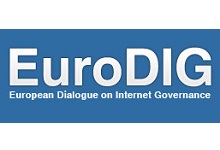Open mic session
8 Jun 2018 02:00h
Event report
After a speech welcoming the participants to the first day of EuroDIG 2018, there was an open mic session for the participants to share their general impressions about the forum and the topics discussed there, in the form of messages.
Ms Sandra Hoferichter (Secretary General, EuroDIG) called on the participants to use this opportunity to express their views about the digital future.
One common messages from youth participants was an appreciation towards the fact that, at EuroDIG, there are lot of young people who, over the next few days, will express their views on different points and engage in discussions with other participants.
With regard to the EuroDIG messages – to be made available after the event, to reflect the main points and take-aways from the discussions – it was said by some that what is missing is the implementation of these messages, and their further discussion. This is why there is a need for a strategy on how to continue working on these messages after the event, especially with respect to their implementation. Some participants also pointed out to the importance of having something concrete done in relation to all the discussions and ideas presented at the event, of having some actual outputs or concrete conclusions.
The global Internet Governance Forum (IGF), it was said, it also constantly working on improvements to put together a cohesive programme, and to have more concrete outputs. However, to be successful, this process also needs the support and participation of the community, to bring more focus and structure into the process. It was also emphasised that in order to be able to form more concrete outputs from IGF processes, more government representatives are needed in attendance, to have direct impact on policy shaping.
From the startup community, there were messages about the need for responsible discussion, in which government representatives also take part. Moreover, it was pointed out that there is a need for more discussion about the roles of private actors such as social networks, and intermediary providers. This is especially important in regard to their accountability and ensuring that they observe human rights and European values.
In the end, it was once more emphasised why the multistakeholder approach is a must when speaking about Internet governance. Unlike 20 years ago when the Internet was purely a technical thing, today it is in every aspect of our lives. Being so, we need people with different expertise to be able to cover all its aspects and its dynamic nature.
Related topics
Related event

